- Home
- Mary Downing Hahn
The Old Willis Place Page 11
The Old Willis Place Read online
Page 11
I looked at her and waited. She seemed unsure how to begin. Finally, she said, "I'm taking a gymnastics class at the Y. This girl named Chelsea asked me where I lived, and when I told her, she said Miss Willis isn't the only ghost here. There are two children. They disappeared a long time ago. No one knows what happened to them. But people say they still haunt the farm."
I gazed at Lissa, envying her pretty face and her shiny hair and her right to live in the world as an ordinary girl. What would she say if I told her the truth about those two children?
"Chelsea says some teenagers came here one night and saw Miss Willis looking out the window of the front parlor," Lissa went on. "They've seen the children, too. Just glimpses of them in the woods or at the gate. They say they're evil spirits."
I bit the inside of my cheek to keep from smiling. Teenagers often sneaked onto the farm to drink beer and smoke and kiss each other. Georgie and I loved to sneak up to their cars and make scary sounds. It was hilarious to see them start the engines and roar away, terrified. We'd been doing it for years, so it was no wonder kids talked about us. We were famous, I guessed.
"Have you ever seen the children's ghosts?" Lissa asked.
I caught Georgie 's eye. He had his hand over his mouth to stifle his laughter. I knew he loved the part about our being evil spirits.
"No." I kept my voice as low as hers and tried to sound scared. "Are they dangerous?"
"I don't think so," Lissa said slowly. "They're just children."
"Children can be just as wicked as old ladies." Georgie swung by his knees from his branch, his face inches from Lissa's.
She backed away from him. "You'd better be careful. If you fall, you could break your neck."
"And die?"
"Maybe." Lissa glanced at me, as if she were unsure what to make of Georgie's behavior.
Georgie hung there, his face red, and laughed. Suddenly, he let himself fall. He hit the ground and lay sprawled in the weeds like a broken doll.
Lissa screamed and covered her face.
"He's all right," I told her. "Look."
Slowly Lissa uncovered her eyes. Georgie sat ten feet below, laughing up at her. He'd knocked the feathers in his hair crooked, but otherwise he was unscathed.
"That was so stupid," Lissa shouted, angry now. "You could have killed yourself!"
"Could I?" Still laughing, Georgie stood up. "What if I'm already dead? What if I'm a ghost?"
I wanted to tell him to stop before Lissa guessed the truth about us, but he was in one of his moods. He'd quit when he felt like it. I gave him a warning look, which he, of course, ignored.
"You're crazy." Lissa's voice was still shaky from the sight of Georgie plummeting out of the tree.
"Boooooo!" Georgie made a scary, google-eyed face at her and ran off. Nero and MacDuff watched him go. The cat remained on his branch and the dog remained on the ground, as if neither wanted to yield to the other.
"Your brother hates me." Lissa looked at me sadly. In a low voice she added, "Maybe you do, too."
"No." I flipped through Clematis, ruffling the pages like leaves. "But I don't see how we can be friends."
"Why not?" Lissa leaned toward me, her face earnest. "I told you I'm sorry. I promise I'll never go near that house again as long as I live."
I sighed and continued to flip the pages. "That's not why we can't be friends. There's so much you don't know about Georgie and me, stuff you'd never understand or even believe."
Lissa studied me intently, her forehead furrowed beneath a tumble of dark hair. "I know more than you think," she said slowly. "Yesterday I walked to those houses across the highway. I was looking for you. After a while I met some kids by the pond."
She paused to look at me closely. Unable to meet her eyes, I pulled a crimson leaf from a branch and twirled its stem in my fingers.
"They told me you don't live there," Lissa went on. "They know everybody, but they've never heard of you. Or Georgie."
"So? I told you we're not allowed to have friends." I shredded the leaf as I spoke. "I don't know them, either."
Lissa inched closer, till her face was inches from mine. "Want to hear what I think?"
I slid out on the limb until it dipped beneath my weight. My mouth felt dry. Had Lissa guessed the truth?
"I think you live right here on the farm," she said. "Like squatters. Maybe your parents are hippies or survivalists or even fugitives. Maybe they belong to a weird cult. I don't know and I don't care. You're my friend. That means your secrets are my secrets, too. I'll never tell anyone the truth about you—or your parents. Especially not Dad."
I shifted my position and the limb swayed. If only everything were as simple as Lissa thought.
"The thing is—" I cut myself off and stared past Lissa at the brown field and the house beyond. With most of the trees' leaves gone, I could see the roof and tall chimneys. How could I explain myself to an ordinary girl like Lissa?
"What's the matter, Diana?" She reached out to touch my hand. "I can keep a secret. Do you live in one of the old barns? Or—"
"It doesn't matter where we live," I said slowly. "We won't be here much longer." As soon as I spoke, I knew it was true.
Lissa's eyebrows rose, giving her face a tense, worried look. "Is it because of me? Did your parents find out we're friends?"
I shook my head and felt the heavy weight of my braid shift. "No, it's not because of you. Or your dad. It's time to go, that's all."
"Do you want to leave?" she asked softly.
"Sort of." I fingered my braid. It was beginning to loosen, and I supposed I needed to redo it. "We've been here for ages.
"Lucky you." Lissa sighed. "Dad and I never stay anywhere long."
"Lucky," I echoed softly. If only she knew.
"But where will you go? If it's not too far, maybe we could still see each other." Lissa's face brightened.
I watched a long loose line of geese zigzag across the sky. Their loud cries rang out like the barking of dogs. They were leaving, too. "I think it will be much too far for us to see each other."
Lissa looked at me sadly. "Well, we can always write. And then maybe someday—"
I shook my head. "No. We won't be allowed to tell you where we are."
Lissa looked down at her feet. "More rules, I guess."
"Yes."
Lissa sighed. "Can you at least tell me when you're leaving? Tomorrow? Next week, next month?"
"I'm not sure." I listened to the thoughts in my head and tried to put them into words. "Georgie and I have to do something first."
"What do you mean—do something?"
"You ask too many questions, Lissa." I didn't know the answer myself. Not yet, at least. Exasperated, I tossed the books out of the tree. Grabbing a branch, I swung after them and landed on my feet as lightly as Nero.
Lissa looked down at me. "I'm scared to jump from here," she said. "It's too high. I could break my leg."
"Then climb down," I said impatiently.
I watched her make her way from branch to branch until she was low enough to drop to the ground. "You and Georgie must have rubber bones or something," she said. "I'd never have the nerve to jump that far."
"We've been jumping out of trees since before you were born."
Lissa laughed as if I were joking. "Oh," she said suddenly, "we forgot the bear." She pointed at Alfie, still perched on his branch.
"Don't worry," I said. "Georgie will come back for him and the books."
Lissa shook her head, still puzzled by my brother 's behavior. "I hope you don't leave for a long time," she said. "I'll really miss you, Diana."
Maybe I'd miss her. Maybe not. She might fade like a forgotten dream after Georgie and I left. Who knew what we'd remember?
We crossed the field to the trailer. A curl of smoke rose from the chimney and the smell of soup met us at the door. Mr. Morrison looked up from the pot he was stirring and smiled. "Well, well, look what the wind blew in," he said cheerfully. "You're just in time f
or a big hot bowl of chicken soup with noodles, made from scratch, the best you ever tasted."
"Yum." Lissa sat at the table and patted the chair beside her. "Sit here, Diana. Dad is the world's greatest soup chef."
Before I could protest, Mr. Morrison set down two bowls and fixed a third for himself. The fragrance reminded me of my mother's soup. She'd made it from Miss Lilian's leftovers, thick and hearty, a treat for all of us, served with chunks of homemade brown bread and cheese.
I pushed the chair back and stood up. "I'm sorry, I can't stay. I have to go home. I promised Georgie—"
"But can't you eat your soup first?" Mr. Morrison asked. "Or bring Georgie back here for lunch? You look like you could use a nice hot meal."
"No, thank you." I edged away. "I really can't stay. I'm sorry."
"Some other time, then," Mr. Morrison said, his face as worried as Lissa's. "The soup's always on, and you're more than welcome to join us for a meal. You and your brother need to put some meat on your bones. You're so thin and pale, both of you."
"Dad," Lissa began, obviously embarrassed by her father's words. He'd meant well, I supposed, so I interrupted her.
"Thanks. That's very kind of you, Mr. Morrison." I opened the door and cold air rushed in. "But Georgie and I have all the food we need."
Safe outside, away from their questions and concerns, I ran with the wind across the field. Being with real live people was just too hard.
I found Georgie in the shed. With Alfie on one side and Nero on the other, he was leafing through Lassie, studying the pictures. A shaft of autumn sunlight lit his hair and face. He was pale, I realized. And thin. Surely he hadn't always looked so fragile.
"Read some more, Diana." Georgie held the book up. "Here's where you left off."
Grateful for something to do, I took the book and began chapter eleven, "The Fight for Existence." The picture showed Lassie, all bones and wet fur, running along with a dead rabbit in her mouth. I knew the dog had to eat, but I wished the artist hadn't shown her intended meal.
Georgie huddled beside me, listening intently to Lassie's struggle to survive her long journey from Scotland to England. He held his breath when she fell sick; he was angry when she was falsely blamed for killing sheep and almost shot, scared when she was captured by dogcatchers, and glad when she escaped.
At the end of chapter seventeen, "Lassie Comes over the Border," Georgie finally let me stop and rest my voice. Lassie was in England at last, safe for a while with a kindly old man and woman who planned to keep her forever.
"They won't, though," Georgie said as I closed the book. "Lassie's not home yet."
"No, she still has a way to go and a few more adventures before she's done."
Georgie lay back on his blankets and gazed out the shed door. It was dark now, and the moon had risen above the trees. It floated there, as big as an orange, dimming the stars but lighting the earth.
"How about us, Diana?" Georgie asked softly. "How far do we have to go before we're done?"
"I don't know." I stared across the silvery field at the black line of trees on the other side. A wind blew up. Branches creaked and swayed. Dried weeds rattled. Nero uncoiled from Georgie's side and stretched, his back arched like a Halloween cat's. He went to the door and peered out, ears pricked.
Georgie turned to me, his face fearful. "Nero hears something," he whispered.
"A mouse," I whispered. "That's all."
We both watched the cat. His body was tense; his tail lashed. He began a deep, vibrating growl.
The wind blew harder. All around us, trees and weeds and tangles of underbrush rustled and sighed and moved. A dry grapevine tapped against the wall. The tin roof rattled as something struck it. The shed's old timbers creaked. Dark clouds raced across the sky, veiling the moon and altering the shadows.
In the doorway, Nero hunkered down. His growl changed to a fierce song, its notes rising and falling along with the wind.
"It's not a mouse." Georgie clung to me. "It's Miss Lilian, she's come for us."
I shut my eyes and held him as tightly as I could. "No, it can't be her," I whispered into his hair. "It just can't."
But in my heart I knew he was right. Miss Lilian was out there in the dark, searching for Georgie and me, eager to punish us for the pranks we'd played on her.
Chapter 14
"Diana," a voice howled from the shadows, "Georgie, it's no use hiding. I'll find you wherever you are!"
The moon shot out from behind a cloud, and there she was in the field, brandishing a cane, her white hair blowing in the wind. Georgie and I stumbled to our feet.
I took my brother's hand. "Quick, out the back way!"
We plunged through a small door in the rear of the shed. With Nero racing ahead, we fled through the woods, tripping over roots and ducking branches. Brambles caught our hair and tore our clothing. But nothing stopped us or even slowed us down. We ran like rabbits fleeing a fox, like deer fleeing a hunter, like mice fleeing an owl, leaping, dodging, practically flying through the underbrush.
"Is she coming?" Georgie cried at one point.
"I don't know." The wind made so much noise we couldn't hear anything but branches thrashing over our heads.
We slid down the bank of the creek and into the ravine where we'd hidden Lissa's bike. It still lay there, rusty now, half submerged in water. We splashed past it and burrowed into a small cave, our favorite hideout. There in the darkness we crouched with Nero and listened. Miss Lilian's voice mingled with the wind's howls. Gradually her calls faded away into the night, and the wind died down.
Georgie cried with relief. I rocked him in my arms as I had for so many years. When his breathing quieted and he stopped sobbing, I lifted his face and looked into his eyes, as brown as a shady pond after rain. "She's gone," I said. "She didn't get us."
"But she'll be back," he said tearfully.
"Yes," I said slowly, "but we'll get away from her again. She'll never catch us."
"She did once," Georgie reminded me.
"We're smarter now." I crawled to the mouth of the cave and looked out. The night was still except for the distant rush of traffic on the highway. "She won't trap us again."
We slept in the cave that night. In the morning, I sneaked back to the shed and retrieved our belongings—our blankets and books, the flashlight, the penknife, and Alfie. Although I kept every sense alert for her presence, I didn't encounter a trace of Miss Lilian. Perhaps she couldn't leave her house in the daylight.
When I returned to the cave, Georgie was sitting at the entrance, braiding vines and leaves into his hair.
"For camouflage," he said. "You should do it, too."
I smoothed the long braid hanging over my shoulder. "I don't care to look like a savage."
"Suit yourself." Georgie finished his task and looked at me. "Do you think it's safe to leave the cave?"
"I didn't see a sign of her." I squatted down beside him. "Maybe she only comes out at night."
Georgie frowned. "I hope you're right."
I watched him poke at the dirt with a stick. "Do you ever have funny thoughts?" I asked him.
"Funny?"
"Odd," I said. "Odd thoughts."
"What do you mean?"
"Remember how the rules came into our heads and we knew them without anyone telling us what they were?"
Georgie kept his head down and scratched harder with the stick. He was writing his name, one of the few things he recalled from school. "Yes," he said slowly, "how could I forget?"
"Well, lately I've had a new thought. It came the same way. No one told me. All of a sudden it was in my head, like colors and smells and sounds, things that don't need words."
"It's about leaving, isn't it?" Georgie didn't look at me. He was adding finishing touches to his name—little curlicues on each letter.
"Do you have the same thought?"
"Yes," he said. "But we have to do something first."
I nodded. "Do you know what it is?"
/> With a gesture of impatience, he rubbed out his name. "I think it's got something to do with her."
"Miss Lilian?"
"Yes." He dropped his voice to a whisper. "And with our bodies. Our real ones."
I shivered. "Someone should bury them and say the right words so we can rest—"
"I know that." Georgie scowled, signaling he'd heard all he wanted to hear about our bodies and their burial.
We sat beside each other silently and watched the last leaves spin down from the trees. The creek was filled with those that had already fallen. Shades of red, yellow, and brown, different shapes and sizes. Some were caught in eddies, others lodged among the stones, and a few raced on the current on their way to a larger stream.
Georgie reached out over the water to prod a few leaves loose with his stick. He watched them sail around a bend and turned to me. "Will you read some more of Lassie? I want to know how it ends before we leave."
"We're coming to a sad part," I warned him.
"Just read," Georgie said. "I'm used to sad parts. And so are you."
I began at chapter eighteen, "The Noblest Gift—Freedom." Lassie had recovered her strength. Every afternoon just at the time school let out, she began pacing the floor of the little cottage. The old folks tried to make her happy. They treated her well, they fed her and petted her and loved her, but still she wanted to leave, she had to leave.
Georgie pressed against me. "Do they let Lassie go?"
I read on. The old woman opened the door. She and her husband followed Lassie to the road that ran by the cottage. They watched Lassie hesitate. They wanted to call her back, but they knew the dog had to leave. The old woman told Lassie it was all right. If she had to go, why, go she must.
Georgie breathed out a long sigh. We were glad Lassie was on her way but sorry for the old man and woman, left alone in their cottage, too sad to eat their evening meal.The old man offered to bring home another dog, a small one, but no dog could take Lassie's place. So he suggested a cat instead, "the bonniest little cat ye ever did see."
Georgie glanced at Nero sitting nearby, licking his paws and scrubbing his face. "I bet it was a big black cat just like Nero."

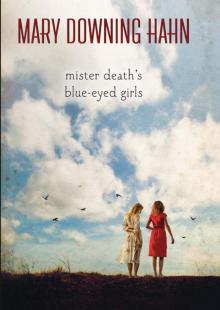 Mister Death's Blue-Eyed Girls
Mister Death's Blue-Eyed Girls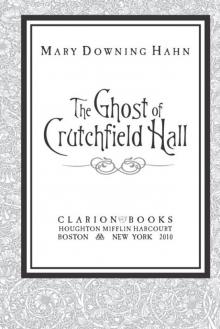 The Ghost of Crutchfield Hall
The Ghost of Crutchfield Hall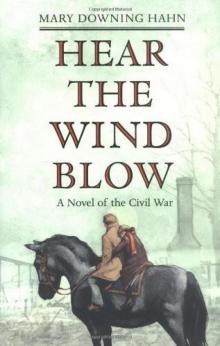 Hear the Wind Blow
Hear the Wind Blow Time of the Witch
Time of the Witch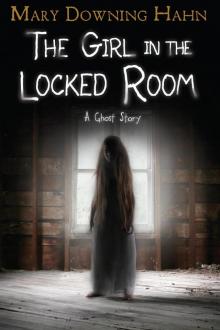 The Girl in the Locked Room: A Ghost Story
The Girl in the Locked Room: A Ghost Story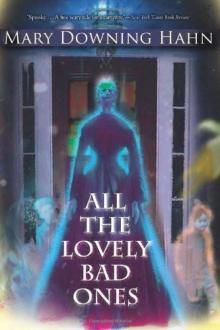 All the Lovely Bad Ones
All the Lovely Bad Ones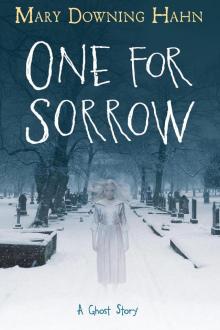 One for Sorrow
One for Sorrow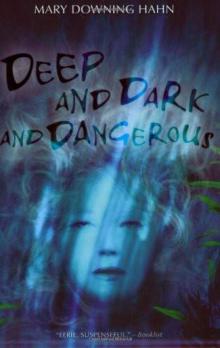 Deep and Dark and Dangerous
Deep and Dark and Dangerous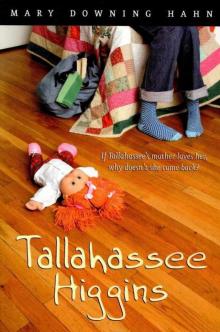 Tallahassee Higgins
Tallahassee Higgins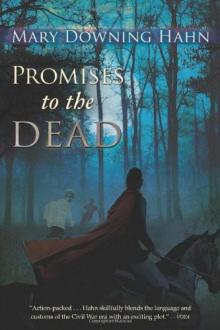 Promises to the Dead
Promises to the Dead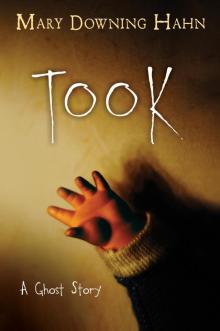 Took: A Ghost Story
Took: A Ghost Story Following My Own Footsteps
Following My Own Footsteps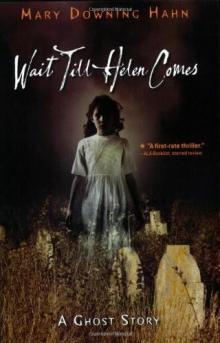 Wait Till Helen Comes: A Ghost Story
Wait Till Helen Comes: A Ghost Story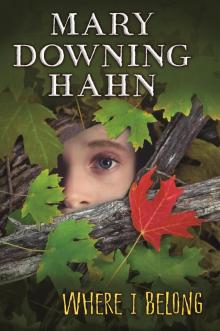 Where I Belong
Where I Belong The Spanish Kidnapping Disaster
The Spanish Kidnapping Disaster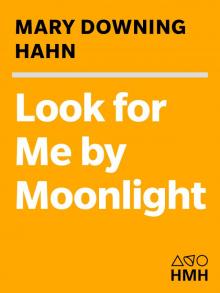 Look for Me by Moonlight
Look for Me by Moonlight The Old Willis Place
The Old Willis Place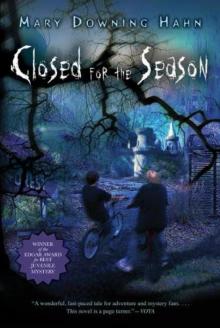 Closed for the Season
Closed for the Season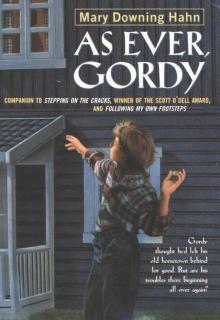 As Ever, Gordy
As Ever, Gordy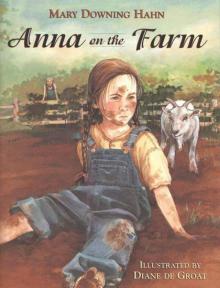 Anna on the Farm
Anna on the Farm The Doll in the Garden
The Doll in the Garden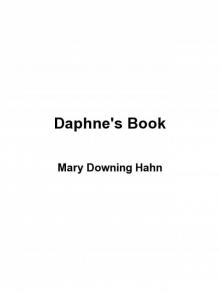 Daphne's Book
Daphne's Book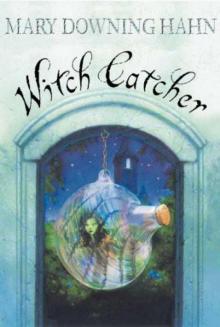 Witch Catcher
Witch Catcher The Gentleman Outlaw and Me--Eli
The Gentleman Outlaw and Me--Eli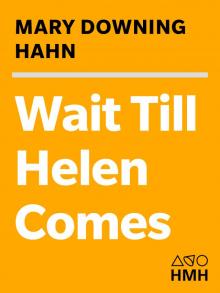 Wait Till Helen Comes
Wait Till Helen Comes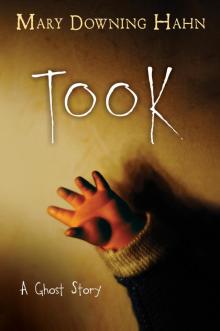 Took
Took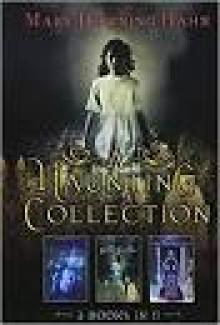 A Haunting Collection
A Haunting Collection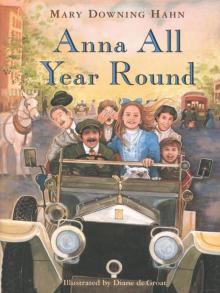 Anna All Year Round
Anna All Year Round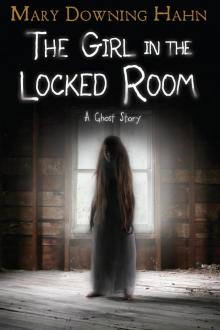 The Girl in the Locked Room
The Girl in the Locked Room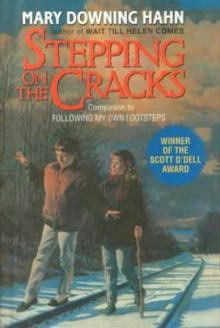 Stepping on the Cracks
Stepping on the Cracks